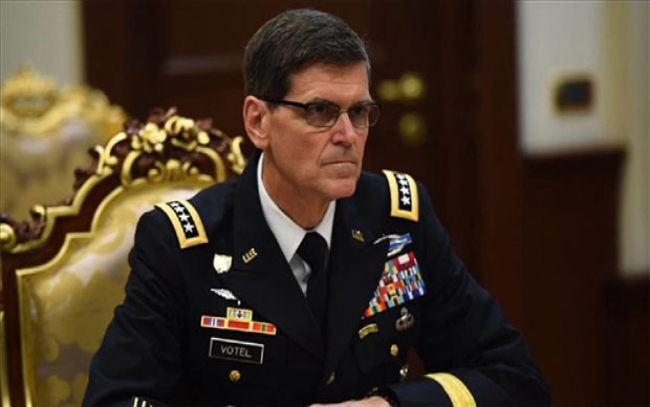KABUL - Commander of the United State Central Command (CENTCOM) Gen. Joseph Votel on Monday asked Pakistan to do more in Afghan peace process as Islamabad’s role remained key for the accomplishment of overall objective.
Addressing reporters here Gen. Votel said cooperation from Pakistan remained key to accomplishing the overall objective of a durable political settlement in Afghanistan.
“We continue to work closely with Pakistan to help them fulfill the important role that they have indicated they want to play. Now is the time for them to step forward, do more and be supportive.”
The CENTCOM commander said extension in the funding to the Afghan Security Forces though 2024 would provide time and resources to fulfill the intent of US South Asia Strategy.
“At the recent NATO summit, international partners agreed to extend funding to the Afghan Security Forces through 2024. This is noteworthy and will provide us both time and resources to fulfill the intent of our South Asia Strategy,” a statement from the Resolute Support RS mission quoted Gen. Votel as saying.
“Since the Afghans took the lead for their own security in August of 2014, we have seen strong continued international support for the Resolute Support mission. This year, 29 of 39 NATO Allies and partners increased their military or financial commitments to the campaign. Significantly, we welcome our Gulf partners from the United Arab Emirates and Qatar to the Resolute Support mission as well,” Votel said.
According to the CENTCOM commander the RS mission had observed remarkable changed in the environment, largely driven by our new strategy. The Afghan people and many Taliban grow more ready for peace, as evidenced by peace marches, local and international religious Ulema condemnations of the insurgency, broad diplomatic support to the Afghan-owned peace process and, of course, the cease-fire that I mentioned earlier.
He told reporters that Afghani Security Forces were improving, but they did require the time and support to contend with both Taliban and Islamic State fighters in the country. “They are fighting and they are taking casualties but they are also very offensive-minded and inflicting losses on the Taliban and the ISIS enemy daily, while expanding their own capabilities and proficiencies every day,” he said.
Referring to the US South Asia strategy, he said, there was cause for cautious optimism and evidence that the South Asia strategy was working.
“The most dramatic evidence of this was manifested recently when our conditions-based approach allowed President Ghani and the Afghan National Defense and Security Forces to set the conditions for the first-ever nationwide cease-fire. Although the cease-fire was temporary, all parties respected the terms and there were very few reported breaches,” he said.
According to Gen. Votel, the ceasefire demonstrated the increased desire for peace, not only from the Afghan people, but from the belligerents of the conflict, as well.
“We saw numerous instances of this during the ceasefire, and we have seen many since its conclusion, even in the midst of ongoing combat operations. Our campaign approach of military pressure provided the time and space for diplomatic and social pressure to pursue this opportunity,” he noted.
Hailing the performance of Afghan security forces, the US general said all six of Afghan national army corps had been frequently engaged in offensive operations simultaneously, and at one point this spring, they were conducting offensive operations in 13 of Afghanistan’s 34 provinces at the same time. This was a testament to the great work by not only our forces, but also others in the NATO-led coalition.
“The Afghan National Defense and Security Forces are orchestrating unprecedented reorganization this year, moving over 30,000 border police and Afghan National Civil Order Police from the Ministry of the Interior to the Ministry of Defense, and initiating a Territorial Army project for long-term local security,” he said. (Pajhwok)
Home » Afghanistan » Do More for Durable Political Settlement in Afghanistan, Gen. Votel to Pakistan
Do More for Durable Political Settlement in Afghanistan, Gen. Votel to Pakistan

